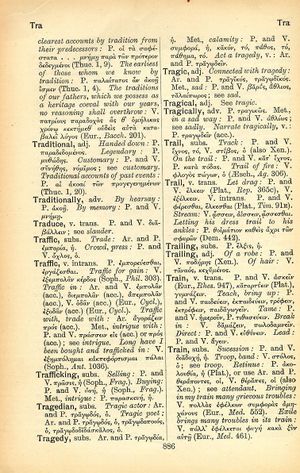train: Difference between revisions
From LSJ
μὴ κακὸν εὖ ἔρξῃς· σπείρειν ἴσον ἔστ' ἐνὶ πόντῳ → do no good to a bad man; it is like sowing in the sea
mNo edit summary |
m (Woodhouse1 replacement) |
||
| Line 1: | Line 1: | ||
{{Woodhouse1 | {{Woodhouse1 | ||
|Text=[[File:woodhouse_886.jpg|thumb|link={{filepath:woodhouse_886.jpg}}]] | |Text=[[File:woodhouse_886.jpg|thumb|link={{filepath:woodhouse_886.jpg}}]] | ||
===verb transitive=== | |||
P. and V. ἀσκεῖν (Eur., '' | [[prose|P.]] and [[verse|V.]] [[ἀσκεῖν]]; ([[Euripides|Eur.]], ''[[Rhesus]]'' 947), [[καταρτύειν]] ([[Plato]]). [[γυμνάζειν]]. | ||
[[teach, bring up]]: P. and V. παιδεύειν, ἐκπαιδεύειν, τρέφειν, ἐκτρέφειν, παιδαγωγεῖν. | [[teach, bring up]]: [[prose|P.]] and [[verse|V.]] [[παιδεύειν]], [[ἐκπαιδεύειν]], [[τρέφειν]], [[ἐκτρέφειν]], [[παιδαγωγεῖν]]. | ||
[[tame]]: P. and V. ἡμεροῦν, P. τιθασεύειν. | [[tame]]: [[prose|P.]] and [[verse|V.]] [[ἡμεροῦν]], [[prose|P.]] [[τιθασεύειν]]. | ||
[[break in]]: V. δαμάζειν, πωλοδαμνεῖν. | [[break in]]: [[verse|V.]] [[δαμάζειν]], [[πωλοδαμνεῖν]]. | ||
[[direct]]: P. and V. εὐθύνειν. | [[direct]]: [[prose|P.]] and [[verse|V.]] [[εὐθύνειν]]. | ||
[[lead]]: P. and V. [[ἄγω | [[lead]]: [[prose|P.]] and [[verse|V.]] [[ἄγω]], [[ἄγειν]]. | ||
===substantive=== | |||
[[sucession]]: P. and V. [[διαδοχή]], ἡ. | [[sucession]]: [[prose|P.]] and [[verse|V.]] [[διαδοχή]], ἡ. | ||
[[troop]], [[band]]: V. [[στόλος]], ὁ; see [[troop]]. | [[troop]], [[band]]: [[verse|V.]] [[στόλος]], ὁ; see [[troop]]. | ||
[[retinue]]: P. [[ἀκολουθία]], ἡ ( | [[retinue]]: [[prose|P.]] [[ἀκολουθία]], ἡ ([[Plato]]). or use [[Aristophanes|Ar.]] and [[prose|P.]] [[θεράποντες]], οἱ, [[verse|V.]] [[θέραπες]], οἱ (also [[Xenophon|Xen.]]); see [[attendant]]. | ||
[[bringing in my train many grievous troubles]]: V. πολλὰς ἐφέλκων συμφορὰς ἀμηχάνους (Eur., ''Med.'' 552). | [[bringing in my train many grievous troubles]]: [[verse|V.]] [[πολλὰς ἐφέλκων συμφορὰς ἀμηχάνους]] ([[Euripides|Eur.]], ''Med.'' 552). | ||
[[exile brings many troubles in its train]]: V. | [[exile brings many troubles in its train]]: [[verse|V.]] [[πόλλ' ἐφέλκεται φυγὴ κακὰ ξὺν αὑτῇ]] ([[Euripides|Eur.]], ''Med.'' 461). | ||
}} | }} | ||
Revision as of 09:15, 20 May 2020
English > Greek (Woodhouse)
verb transitive
P. and V. ἀσκεῖν; (Eur., Rhesus 947), καταρτύειν (Plato). γυμνάζειν.
teach, bring up: P. and V. παιδεύειν, ἐκπαιδεύειν, τρέφειν, ἐκτρέφειν, παιδαγωγεῖν.
tame: P. and V. ἡμεροῦν, P. τιθασεύειν.
break in: V. δαμάζειν, πωλοδαμνεῖν.
substantive
sucession: P. and V. διαδοχή, ἡ.
troop, band: V. στόλος, ὁ; see troop.
retinue: P. ἀκολουθία, ἡ (Plato). or use Ar. and P. θεράποντες, οἱ, V. θέραπες, οἱ (also Xen.); see attendant.
bringing in my train many grievous troubles: V. πολλὰς ἐφέλκων συμφορὰς ἀμηχάνους (Eur., Med. 552).
exile brings many troubles in its train: V. πόλλ' ἐφέλκεται φυγὴ κακὰ ξὺν αὑτῇ (Eur., Med. 461).

